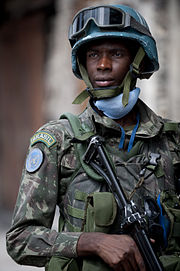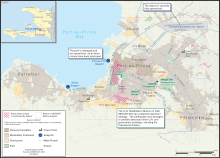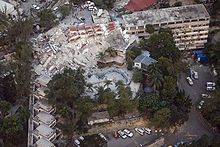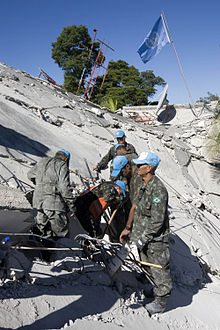- United Nations Stabilisation Mission in Haiti
-

United Nations Stabilization Mission in Haiti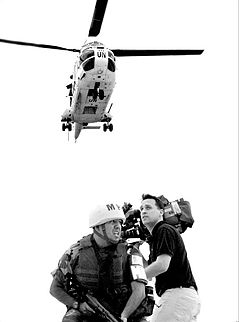
Chilean helicopter during the 2006 electionsOrg type Peacekeeping Mission Acronyms MINUSTAH Head Mariano Fernández Amunátegui (acting, see 2010 Haiti earthquake) Status Active Established 1 June 2004 Website UN Peacekeeping: MINUSTAH, www.minustah.org (French) Parent org UN Department of Peacekeeping Operations, United Nations Security Council The United Nations Stabilisation Mission In Haiti (UNSTAMIH) (French: Mission des Nations Unies pour la stabilisation en Haïti), also known as MINUSTAH, an acronym of the French translation, is a United Nations peacekeeping mission in Haiti that has been in operation since 2004. The mission's military component is led by the Brazilian Army and the force commander is Brazilian. MINUSTAH's mandate was most recently extended by United Nations Security Council Resolution 1944 past its October 15, 2010 deadline[1] amid fears of instability.[2] The mission's current mandate runs through October 15th, 2011 with the intention of further renewal.[3] The force is composed of 8,940 military personnel and 3,711 police, supported by an international civilian personnel, a local civilian staff and United Nations Volunteers.[4]
Following the 2010 Haiti earthquake, the United Nations reported that the headquarters of the mission in Port-au-Prince had collapsed and that the mission's chief, Hédi Annabi of Tunisia, his deputy Luiz Carlos da Costa of Brazil, and the acting police commissioner, the Royal Canadian Mounted Police's Doug Coates of Canada, were confirmed dead.[5][6][7] On 14 January 2010, UN headquarters dispatched the former head of MINUSTAH and current Assistant Secretary-General for Peacekeeping Operations, Edmond Mulet, as the organisation's Acting Special Representative of the Secretary-General and interim head of MINUSTAH.[8] Mulet clarified on January 22 that MINUSTAH will concentrate on assisting the Haitian National Police in providing security within the country after the earthquake, while American and Canadian military forces will distribute humanitarian aid and provide security for aid distribution.[9]
Contents
Background
See also: 2004 Haitian coup d'étatAccording to its mandate from the UN Security Council, MINUSTAH is required to concentrate the use of its resources, including civilian police, on increasing security and protection during the electoral period and to assist with the restoration and maintenance of the rule of law, public safety and public order in Haiti.[10] MINUSTAH was established by United Nations Security Council Resolution 1542 on 30 April 2004 because the Security Council deemed the situation in Haiti to be a threat to international peace and security in the region.[11] In 2004, UN peacekeepers stormed Cité Soleil in an attempt to gain control of the area and end the anarchy.[12]
In 2004, independent human rights organizations accused MINUSTAH and the Haitian National Police (HNP) of collaborating in numerous atrocities against civilians.[13][14][15] The UN, after repeatedly denying having taken the lives of any civilians, later admitted that civilians may have been killed, but argued that this was not intentional, and that it occurred as a by-product of their crackdown on what they call “gangs”. They also said that the UN and MINUSTAH deeply regretted any loss of life during the operation.[16][17]
In early 2005, MINUSTAH force commander Lieutenant-General Augusto Heleno Ribeiro Pereira testified at a congressional commission in Brazil that “we are under extreme pressure from the international community to use violence,” citing Canada, France, and the United States.[18] Later in the year, he resigned, and on 1 September 2005, was replaced by General Urano Teixeira da Matta Bacellar as force commander of MINUSTAH. On 7 January 2006, Bacellar was found dead in his hotel room.[19] His interim replacement was Chilean General Eduardo Aldunate Hermann.
On 17 January 2006, it was announced that Brazilian General José Elito Carvalho de Siqueira would be the permanent replacement for Bacellar as the head of the United Nations' Haiti force.[20]
On 14 February 2006, in Security Council Resolution 1658, the United Nations Security Council extended MINUSTAH's mandate until 15 August 2006.[21]
MINUSTAH is also a precedent as the first mission in the region to be led by the Brazilian and Chilean military, and almost entirely composed of, Latin American forces, particularly from Brazil, Argentina, Chile, Bolivia, Ecuador and Uruguay.[22] From 1 September 2007 until his death following the earthquake on 12 January 2010, the mission has been led by Tunisian Hédi Annabi.[23]
United Nations reports and resolutions
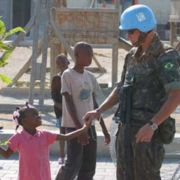 Brazilian MINUSTAH soldier with a Haitian girl in February 2005
Brazilian MINUSTAH soldier with a Haitian girl in February 2005
On 23 February 2004, the United Nations Security Council was convened at the request of CARICOM for the first time in four years to address the deteriorating situation in Haiti.[24]
On 29 February 2004, the Security Council passed a resolution "taking note of the resignation of Jean-Bertrand Aristide as President of Haiti and the swearing-in of President Boniface Alexandre as the acting President of Haiti in accordance with the Constitution of Haiti" and authorized the immediate deployment of a Multinational Interim Force.[25]
On 30 April 2004, MINUSTAH was established and given its mandate with a military component of up to 6,700 troops.[26]
In July the General Assembly authorized the financing of the mission with $200 million[27] which followed a donors' conference in Washington DC.[28]
The first progress report from MINUSTAH was released at the end of August.[29]
In September the interim president of Haiti, Boniface Alexandre, spoke to the United Nations General Assembly in support of MINUSTAH.[30]
In November there was a second report,[31] and the Security Council mandate for MINUSTAH.[32]
The mandate has most recently been extended by the Security Council until October 2010 "with the intention of further renewal".[33]
Status
See also: 2004 Haitian rebellion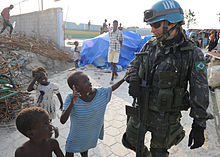 Brazilian Army U.N. peacekeeper.
Brazilian Army U.N. peacekeeper.
Although the United Nations Stabilization Mission (MINUSTAH) has been in Haiti since 2004, as of 2007, it continued to struggle for control over the armed gangs. It maintains an armed checkpoint at the entrance to the shanty town of Cité Soleil and the road is blocked with armed vehicles.[34] In January 2006, two Jordanian peacekeepers were killed in Cité Soleil.[35] In October 2006 a heavily armed group of the Haitian National Police were able to enter Cité Soleil for the first time in three years and were able to remain one hour as armored UN troops patrolled the area. Since this is where the armed gangs take their kidnap victims, the police's ability to penetrate the area even for such a short time was seen as a sign of progress.[36] The situation of continuing violence is similar in Port-au-Prince. Ex-soldiers, supporters of the ex-president, occupied the home of ex-president Jean-Bertrand Aristide against the wishes of the Haitian government.[37] Before Christmas 2006 the UN force announced that it would take a tougher stance against gang members in Port-au-Prince, but since then the atmosphere there has not improved and the armed roadblocks and barbed wire barricades have not been moved. After four people were killed and another six injured in a UN operation exchange of fire with criminals in Cité Soleil in late January 2007, the United States announced that it would contribute $20 million to create jobs in Cité Soleil.[38][39]
In early February 2007, 700 UN troops flooded Cité Soleil resulting in a major gun battle. Although the troops make regular forcible entries into the area, a spokesperson said this one was the largest attempted so far by the UN troops.[40] On 28 July 2007, Edmond Mulet, the UN Special Representative in Haiti and MINUSTAH Mission Chief, warned of a sharp increase in lynchings and other mob attacks in Haiti. He said MINUSTAH, which now has 9,000 troops there, will launch a campaign to remind people lynchings are a crime.[41]
On 2 August 2007, UN Secretary-General Ban Ki Moon arrived in Haiti to assess the role of the UN forces, announcing that he would visit Cité Soleil during his visit. He said that it was Haiti's largest slum and as such was the most important target for U.N. peace keepers in gaining control over the armed gangs. During his visit he announced an extension of the mandate of the UN forces in Haiti.[42] It took MINUSTAH three months and 800 arrests to deal with the gangs and lessen the number of kidnappings on the streets.[43]
President René Préval has expressed ambivalent feelings about the UN security presence, stating “if the Haitian people were asked if they wanted the UN forces to leave they would say yes.”[44] Survivors frequently blame the UN peace keepers for deaths of relatives.[45]
In April 2008, Haiti was facing a severe food crisis as well as governmental destabilization to Parliament's failure to ratify the president's choice of a prime minister. There were severe riots and the UN force fired rubber bullets in Port-au-Prince and the riot calmed.[46] The head of MINUSTAH has called for a new government to be chosen as soon as possible. Meanwhile, the UN provided emergency food.[47] Haiti was hit by four consecutive hurricanes between August and September 2008. These storms crippled coastal regions, requiring humanitarian aid for 800,000.[48]
Critics of MINUSTAH's goal of providing security say that the provision of increased police presence is coming with the unfortunate consequence of neglecting the vast socioeconomic problems in the area, the lack of effort in addressing infrastructure improvement, the joblessness and the pervasive poverty. In 2009, with the appointment of former U.S. President Bill Clinton as the UN Special Envoy, there is hope that the international donor community will provide increased aid. MINUSTAH renewed its commitment to Haiti, and $3 billion for projects has been pledged by the international community, much of this for rebuilding after the hurricanes. However, in Cité Soleil, there are signs of a desire for political independence that the international community would rather ignore.[43]
In October 2010, 9 months after the earthquake, the UN extended MINUSTAH's mission. The extension was greeted by unusual anger in Port-au-Prince with demonstrators saying "Down with the occupation" and burning the flag of Brazil, as representative of the largest contingent of MINUSTAH.[49]
2010 Haiti earthquake
On 12 January 2010, the United Nations reported that headquarters of the United Nations Stabilization Mission in Haiti (MINUSTAH), the Christopher Hotel in Port-au-Prince, collapsed, and several other UN facilities were damaged; a large number of UN personnel were unaccounted for in the aftermath of the 2010 Haiti earthquake.[50] The Mission's Chief, Hédi Annabi, was reported dead on 13 January by President René Préval and French news sources and on 16 January the United Nations confirmed the death after his body was recovered by a search and rescue team from China.[51] Principal Deputy Special Representative Luiz Carlos da Costa was also confirmed dead, as well as the Acting Police Commissioner, Royal Canadian Mounted Police (RCMP) Superintendent Doug Coates, who were meeting with eight Chinese nationals—four peacekeepers and a delegation of four police officers from China—when the earthquake struck.[52] The Chinese search and rescue team recovered the bodies of the ten individuals on 16 January 2010. Jens Kristensen, senior humanitarian officer for the UN was rescued by a Fairfax, Virginia team after five days trapped in the rubble.[53]
Mission composition
Nepalese members of MINUSTAH secure an airdrop of aid supplies in Mirebalais in January 2010
Heads of the United Nations Stabilization Mission in Haiti:
- Juan Gabriel Valdés of Chile, August 2004 to May 2006.[54]
- Edmond Mulet of Guatemala, June 2006 to August 2007.[55]
- Hédi Annabi of Tunisia, September 2007 to January 2010.[56]
- Mariano Fernandez of Chile, June 2011.
Force commanders of the MINUSTAH military component:
- Army General Augusto Heleno Ribeiro Pereira, Brazil, 2004 to August 2005
- Divisional General Urano Teixeira da Matta Bacellar, Brazil, September 2005 to January 2006.[57]
- General Eduardo Aldunate Hermann, Chile, January 2006 (interim appointment).
- Divisional General José Elito Carvalho Siqueira, Brazil, January 2006 to January 2007.[58]
- Brigadier General Carlos Alberto dos Santos Cruz, Brazil, January 2007 to April, 2009.[59]
- Brigadier General Floriano Peixoto Vieira Neto, Brazil, April, 2009 to March 2010.
- Brigadier General Luiz Guilherme Paul Cruz, Brazil, March 2010 to Present.
Countries contributing military personnel (7,039 in all):
- Argentina (558 including a field hospital ), Bolivia (208), Brazil (2,200), Canada (10), Chile (499), Croatia (3), Ecuador (67), France (2), Guatemala (118), Jordan (728), Nepal (1,075), Paraguay (31), Peru (209), the Philippines (157), Sri Lanka (959), United States (4), and Uruguay (1,135).[60][61]
Countries contributing police/civilian personnel (2,031 in all):
- Israel (14), Benin (32), Brazil (4), Burkina Faso (26), Cameroon (8), Canada (94), Central African Republic (7), Chad (3), Chile (15), China (143), Colombia (37).[60][61] Côte D'Ivoire (60), DR Congo (2), Egypt (22), El Salvador (7), France (64), Grenada (3), Guinea (55), India (139), Italy (4), Jamaica (5), Jordan (312), Madagascar (2), Mali (55), Nepal (168), Niger (62), Nigeria (128), Pakistan (248), Philippines (18), Romania (23), Russian Federation (10), Rwanda (14), Senegal (131), Serbia (5), Spain (41), Sri Lanka (7), Togo (5), Turkey (46), United States (48), Uruguay (7), and Yemen (1).[60][61]
Cholera controversy
A UN base was reportedly a source for the 2010 Haitian cholera outbreak, which, as of early December 2010, had killed an estimated 2,120 people according to the Haitian government.[62] While by February 9th, 2011, the Haitian Ministry of Health reported 4,549 cholera-related deaths, and 231,070 cases of infection, estimates by the United Nations put the numbers at two to four times higher than these.[63] Of most concern for human rights advocates was MINUSTAHs failure to quickly investigate, monitor, and address its lax sanitation standards even after evidence linked the cholera infections to a UN base which was discharging sewage into a tributary of the Artibonite River. Following two months of pressure, 2,500 deaths, and 130,000 infections, the UN finally agreed to testing and investigation to find the cholera source.[64]
Criticism
A number of incidents and the aim of the UN mission itself have led to widespread criticism of its actions and appeal for its departure.
Political bias
The United Nations Stabilization Mission in Haiti is the only significant military mission of the United Nations dispatched to a country facing an internal conflict without a peace agreement between the parties.[65] Critics have characterized MINUSTAH as an attempt by the United States, Canada and France to oust Haiti's democratically elected populist president Jean Bertrand Aristide, neutralize the supporters of Fanmi Lavalas,[66] and secure the more pro-Western government of Gérard Latortue. In 2005, a report undertaken by Harvard Law Student Advocates for Human Rights claimed that the UN stabilization force "effectively provided cover for the police to wage a campaign of terror in Port-au-Prince's slums",[67] which constitute "an unflinching bastion of support for Aristide and for Lavalas".[68]
6 July 2005 incident
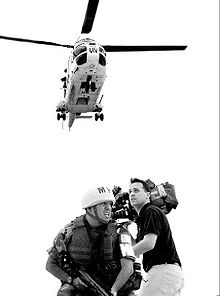 Chilean helicopter during the 2006 elections
Chilean helicopter during the 2006 elections
On 6 July 2005, MINUSTAH carried out a raid in the Cité Soleil section of Port-au-Prince.[69] MINUSTAH spokespeople claimed that the raid targeted a base of illegally armed rebels led by Dread Wilme. Reports from pro-Lavalas sources, as well as journalists such as Kevin Pina, contend that the raid targeted civilians and was an attempt to destroy the popular support for Haiti's exiled former leader, Aristide, before scheduled upcoming elections. The "totally inappropriate solution for the member-states to tell the UN to take sides in Haiti" has not only been denounced by Westerners but also resented by the local population.
Estimates on the number of fatalities range from five to as high as 80,[70] with the higher numbers being claimed by those reporting that the raid targeted civilians. All sources agree that no MINUSTAH personnel were killed. All sources also agree that Dread Wilme (born "Emmanuel Wilmer") was killed in the raid. MINUSTAH spokespeople called Wilme a "gangster." Other sources, such as the pro-Aristide Haitian Lawyers Leadership Network call Wilme a community leader and a martyr.[71]
The incident became a focal point for groups who oppose the MINUSTAH occupation of Haiti and who support the return of President Aristide.[34] MINUSTAH has also been accused by opponents of standing by and allowing the Haitian National Police to commit atrocities and massacres against Lavalas supporters and Haitian citizens opposed to the current occupation.
On 6 January 2006, UN mission head Juan Gabriel Valdés announced that MINUSTAH forces would launch another raid on Cité Soleil. Dismissing fears by human rights groups that more civilians will be killed, Valdés said, "We are going to intervene in the coming days. I think there'll be collateral damage but we have to impose our force, there is no other way."[72]
18 June 2009 incident
Fanmi Lavalas, Haiti's largest political party and grassroots movement, laid Catholic priest Father Gerard Jean-Juste to rest on 18 June accompanied by thousands of mourners. The procession and demonstration were suddenly interrupted by gunfire that could be heard from around the corner. Witnesses report that Brazilian soldiers with the United Nations military mission opened fire after attempting to arrest one of the mourners. The UN has since denied the shooting and claim that the victim had been killed by either a rock thrown by the crowd or a blunt instrument. Eyewitnesses on the scene have countered that the UN is trying to cover-up the incident.[73]
Legal proceedings
A trial involving the Brazilian contingent of the military forces of the MINUSTAH is currently in progress at the Inter-American Court of Human Rights (IACHR). The case, brought forward by Mario Joseph from the Bureau des Avocats Internationaux (BAI) and Brian Concannon from the Institute for Justice and Democracy in Haiti, concerns Jimmy Charles, a grassroots activist who was arrested by UN troops in 2005, and handed over to the Haitian police. His body was found a few days later in the morgue, filled with bullet holes.[74] The BAI filed a complaint in Haitian courts, to no avail, and in early 2006 it filed a petition with the IACHR. The IACHR accepted the case regarding the State of Haiti, and rejected the complaint against Brazil,[75] showing a legal vacuum in the UN's accountability.
Failures to Pursue Allegations of Violence and Sexual Exploitation
In a report submitted to the UN Human Rights Council in March 2011, human rights advocates raise several instances where MINUSTAH troops allegedly violated human rights law, including the Geneva Conventions and their Additional Protocols.[76] These include reports of sexual abuse committed by MINUSTAH troops, including sexual coercion of minors; as well as threats of death, physical harm and sexual violence against Haitian civilians made by the troops.[77] On August 17, 2010, employees of a hotel near MINUSTAH’s base in Cap Haitien heard a cry of “they are suffocating me” coming from the base. Later that day, the body of sixteen year-old Jean Gerald Gilles was found hanging inside the base. Gilles had reportedly been performing odd jobs on the base for money or food, and many believe he was killed after being accused of stealing money from a soldier.[78] These incidents are all marked by a failure by MINUSTAH and other officials to investigate and pursue the allegations. Under the Status of Forces Agreement (SOFA) between the United Nations and the Haitian government, MINUSTAH forces receive broad immunity for crimes committed in Haiti.[79] None of those responsible for sexual exploitation were brought to justice in Haiti, despite the fact that the alleged violations may constitute war crimes, and under the SOFA, MINUSTAH must respect the Geneva Conventions in the context of its deployment in Haiti.[80]
See also
- List of UN peacekeeping missions
- List of countries where United Nations peacekeepers are currently deployed
Notes
- ^ United Nations Security Council (13 October 2009). "Resolution 1892 (2009)". PDF. United Nations. http://www.un.org/ga/search/view_doc.asp?symbol=S/RES/1892%282009%29. Retrieved 2010-01-14.
- ^ "Security Council, Renewing Haiti Mission Mandate in Resolution 1944 (2010), Looks to Review of Situation After Pending Elections, New Government". UN Department of Public Information, News and Media Division. 14 October 2010. http://www.un.org/News/Press/docs/2010/sc10054.doc.htm. Retrieved 25 December 2010.
- ^ "Security Council, Renewing Haiti Mission Mandate in Resolution 1944 (2010), Looks to Review of Situation After Pending Elections, New Government". UN Department of Public Information, News and Media Division. 14 October 2010. http://www.un.org/News/Press/docs/2010/sc10054.doc.htm. Retrieved 25 December 2010.
- ^ "Security Council boosts force levels for military, police components". UN Department of Public Information, News and Media Division. 19 January 2010. http://www.un.org/News/Press/docs/2010/sc9847.doc.htm.
- ^ "Briefing by Martin Nesirky, Spokesperson for the Secretary-General, and Jean Victor Nkolo, Spokesperson for the President of the General Assembly". United Nations. 13 January 2010. http://www.un.org/News/briefings/docs/2010/db100113.doc.htm. Retrieved 13 January 2010.
- ^ "Clinton visits quake-hit Haitians". BBC News. 16 January 2010. http://news.bbc.co.uk/1/hi/world/americas/8463490.stm. Retrieved 16 January 2010.
- ^ "Haiti - MINUSTAH - Facts and Figures". un.org. http://www.un.org/depts/dpko/missions/minustah/facts.html. Retrieved 2007-08-14.
- ^ "Ban mourns deaths of top UN officials in Haiti quake". United Nations. 16 January 2010. http://www.un.org/apps/news/story.asp?NewsID=33499&Cr=haiti&Cr1=. Retrieved 18 January 2010.
- ^ "Joint UN team to assess protection issues in quake-hit Haiti". United Nations. 22 January 2010. http://www.un.org/apps/news/story.asp?NewsID=33557&Cr=haiti&Cr1=. Retrieved 22 January 2010.
- ^ "Haiti: former Senator detained after UN mission finds illegal weapons". un.org. http://www.un.org/apps/news/story.asp?NewsID=17082&Cr=Haiti&Cr1. Retrieved 2007-08-14.
- ^ "Haiti - MINUSTAH - Mandate". United Nations. http://www.un.org/depts/dpko/missions/minustah/mandate.html. Retrieved 2007-08-15.
- ^ "UN peacekeepers storm Haiti slum". BBC News. December 15 2004. http://news.bbc.co.uk/2/hi/americas/4096841.stm. Retrieved 2007-08-16.
- ^ "Haiti: Human Rights Investigation November 11–21, 2004" (PDF). Miami Law. Archived from the original on 2007-08-10. http://web.archive.org/web/20070810081052/http://www.law.miami.edu/cshr/CSHR_Report_02082005_v2.pdf. Retrieved 2007-08-15.
- ^ "Haiti: Amnesty International calls on the transitional government to set up an independent commission of enquiry into summary executions attributed to members of the Haitian National Police". Amnesty International. http://web.amnesty.org/library/Index/ENGAMR360602004?open&of=ENG-HTI. Retrieved 2007-08-15.
- ^ "Document currently not found" (PDF). Harvard Law. Archived from the original on 2007-08-07. http://web.archive.org/web/20070807014656/http://www.law.harvard.edu/programs/hrp/CAP/Text/Haiti_English_Final.pdf. Retrieved 2007-08-15.
- ^ Buncombe, Andrew (2006-01-10). "UN admits civilians may have died in Haiti peacekeeping raid". London: The Independent. http://news.independent.co.uk/world/americas/article337553.ece. Retrieved 2007-08-15.
- ^ "MINUSTAH Statement Relating to the Operation Conducted on 05 July 2005 at Cite Soleil" (PDF). UN United Nations Stabilization Mission in Haiti. http://www.un.org/Depts/dpko/missions/minustah/pb060705e.pdf. Retrieved 2007-08-15.
- ^ "Canada plays big role in propping up Haiti regime". ZNet. http://www.zcommunications.org/znet/viewArticle/7121. Retrieved 2007-08-15.
- ^ "Haiti UN mission chief found dead". BBC News. 2006-01-08. http://news.bbc.co.uk/2/hi/americas/4590700.stm. Retrieved 2007-08-15.
- ^ "New peacekeeping head for Haiti". BBC News. 2006-01-18. http://news.bbc.co.uk/2/hi/americas/4624962.stm. Retrieved 2007-08-15.
- ^ "Security Council calls on Haitians to refrain from violence". China View. http://news.xinhuanet.com/english/2006-02/15/content_4180775.htm. Retrieved 2007-08-15.
- ^ "The Changing Role of the Military in Latin America" (PDF). Focal. Archived from the original on 2007-07-10. http://web.archive.org/web/20070710133152/http://www.focal.ca/pdf/Latam_military.pdf. Retrieved 2007-08-15.
- ^ "Prise de fonction du nouveau Représentant spécial du Secrétaire général des Nations Unies pour Haïti et Chef de la MINUSTAH". MINUSTAH. Archived from the original on 2008-01-08. http://web.archive.org/web/20080108084526/http://www.minustah.org/articles/639/1/Prise-de-fonction-du-nouveau-Representant-special-du-Secretaire-general-des-Nations-Unies-pour-Haiti-et-Chef-de-la-MINUSTAH/PIOPR347FR2007.html. Retrieved 2007-08-31.
- ^ United Nations Security Council Verbatim Report meeting 4917 on 26 February 2004 (retrieved 2007-10-18)
- ^ United Nations Security Council Resolution 1529 S-RES-1529(2004) on 29 February 2004 (retrieved 2007-10-18)
- ^ United Nations Security Council Resolution 1542 S-RES-1542(2004) on 30 April 2007 (retrieved 2007-10-18)
- ^ United Nations General Assembly Resolution 311 session 58 on 30 July 2004 (retrieved 2007-10-18)
- ^ United Nations Security Council Presidential Statement S-PRST-2004-32 page 2 on 10 September 2004 (retrieved 2007-10-18)
- ^ United Nations Security Council Document 698 S-2004-698 on 30 August 2004 (retrieved 2007-10-18)
- ^ United Nations General Assembly Verbatim Report meeting 6 session 59 page 8, President Alexandre Haiti on 22 September 2004 at 15:00 (retrieved 2007-10-18)
- ^ United Nations Security Council Document 908 Report of the Secretary-General on the United Nations Stabilization Mission in Haiti on 18 November 2004
- ^ United Nations Security Council Verbatim Report meeting 5090 on 29 November 2004 (retrieved 2007-10-18)
- ^ United Nations Security Council Resolution 1892 S-RES-1892(2009) page 3 on 13 October 2009 (retrieved 2009-10-29)
- ^ a b "Hoping for change in Haiti’s Cité-Soleil". International Red Cross. http://www.redcross.int/EN/mag/magazine2006_2/10-11.html. Retrieved 2007-08-16.
- ^ "Two UN soldiers killed in Haiti". BBC News. January 18 2006. http://news.bbc.co.uk/2/hi/americas/4622772.stm. Retrieved 2007-08-16.
- ^ "Haiti police visit gang stronghold". BBC Caribbean. http://www.bbc.co.uk/caribbean/news/story/2006/10/061004_soleil.shtml. Retrieved 2007-08-02.
- ^ "Ex-soldiers occupy Aristide home". BBC News. December 16 2004. http://news.bbc.co.uk/2/hi/americas/4100091.stm. Retrieved 2007-08-16.
- ^ "HAITI: Poor Residents of Capital Describe a State of Siege". ipsnews. http://ipsnews.net/news.asp?idnews=36772. Retrieved 2007-08-02.
- ^ "US aid for Cite Soleil". BBC Caribbean. http://www.bbc.co.uk/caribbean/news/story/2007/02/070202_citesoleilaid.shtml. Retrieved 2007-08-02.
- ^ "UN troops flood into Haiti slum". BBC New. http://www.bbc.co.uk/caribbean/news/story/2007/02/070211_unhaiti.shtml. Retrieved 2007-08-14.
- ^ "UN concerned at Haiti lynchings". BBC News. 2007-07-28. http://news.bbc.co.uk/2/hi/americas/6920240.stm. Retrieved 2007-08-02.
- ^ "UN chief visits Haiti". BBC Caribbean. http://www.bbc.co.uk/caribbean/news/story/2007/08/070802_haitun.shtml. Retrieved 2007-08-15. On October 09-2009, there were 11 UN peacekeepers in Haiti who died from a plane crash, in the city of Ganthier.
- ^ a b Guidi, Ruxandra (August 20, 2009). "MINUSTAH Focuses on Security in Haiti's Cité Soleil Slum". Americas Quarterly (America Council and Society of the Americas). http://www.americasquarterly.org/haiti-cite-soleil. Retrieved 2010-01-29.
- ^ "UN chief visits Haiti". BBC Caribbean. http://www.bbc.co.uk/caribbean/news/story/2007/08/070802_haitun.shtml. Retrieved 2007-08-02.
- ^ Jordan, Sandra (2007-04-01). "Haiti's children die in UN crossfire". London: Guardian Unlimited. http://observer.guardian.co.uk/world/story/0,,2047451,00.html. Retrieved 2007-08-02.
- ^ "Calm returns to Haiti after riots". BBC News. 2008-04-10. http://news.bbc.co.uk/2/hi/americas/7341683.stm. Retrieved 2008-07-13.
- ^ "UN appeals to Haitian politicians". BBC News. 2008-04-17. http://news.bbc.co.uk/2/hi/americas/7353712.stm. Retrieved 2008-07-13.
- ^ André, Richard (January 14, 2010). "A Haitian-American Perspective: Resilience in the Face of Tragedy". Americas Quarterly (America Council and Society of the Americas). http://www.americasquarterly.org/node/1163. Retrieved 2010-01-29.
- ^ http://english.aljazeera.net/news/americas/2010/10/2010101516941370819.html
- ^ "Briefing by Martin Nesirky, Spokesperson for the Secretary-General, and Jean Victor Nkolo, Spokesperson for the President of the General Assembly". United Nations. 2010-01-13. http://www.un.org/News/briefings/docs/2010/db100113.doc.htm. Retrieved 2010-01-13.
- ^ "U.N. mission chief in Haiti killed in quake". Reuters. 2009-02-09. http://www.reuters.com/article/idUSTRE60C5N820100113. Retrieved 2010-01-13.
- ^ "Statement of confirmation of death of Special Representative of the Secretary-General in Haiti, Hédi Annabi, Principal Deputy Special Representative, Luiz Carlos da Costa, and Acting UN Police Commissioner in Haiti, Doug Coates". United Nations. http://www.un.org/en/peacekeeping/missions/minustah/documents/sg_statement_16012010pdf.pdf. Retrieved 17 January 2010.
- ^ Christian Science Monitor, "Haiti earthquake: How a top UN official was plucked from the rubble", Howard LaFranchi, 26 January 2010 (accessed 30 January 2010)
- ^ "Juan Gabriele Valdes appointed special representative and head of UN Mission in Haiti". www.un.org. http://www.un.org/News/Press/docs/2004/sga881.doc.htm. Retrieved 2008-07-13.
- ^ "Secretary-General appoints Edmond Mulet of Guatemala his special representative in Haiti". www.un.org. http://www.un.org/News/Press/docs/2006/sga1007.doc.htm. Retrieved 2008-07-13.
- ^ "Secretary-General appoints Hédi Annabi OF Tunisia Special Representative, Head of United Nations Stabilization Mission in Haiti". www.un.org. http://www.un.org/News/Press/docs/2007/sga1081.doc.htm. Retrieved 2008-07-13.
- ^ "New commander leads Haiti force". BBC News. 2005-09-01. http://news.bbc.co.uk/2/hi/americas/4205630.stm. Retrieved 2008-07-13.
- ^ "Secretary-General Appoints Lieutenant General José Elito Siqueira Carvalho new Force Commander of UN Mission in Haiti". www.unis.unvienna.org. http://www.unis.unvienna.org/unis/pressrels/2006/sga975.html. Retrieved 2008-07-13.
- ^ "Haiti: Brazilian general to be new Force Commander for UN peacekeeping mission". www.un.org. http://www.un.org/apps/news/story.asp?NewsID=21192&Cr=haiti&Cr1=. Retrieved 2008-07-13.
- ^ a b c "United Nations Stabilization Mission in Haiti". United Nations. http://www.un.org/depts/dpko/missions/minustah/facts.html. Retrieved 2007-11-25.
- ^ a b c UN Mission's Contributions by Country, United Nations.
- ^ Haiti cholera: UN peacekeepers to blame, report says BBC News, Retrieved 2010-12-08
- ^ Bri Kouri Nouvel Gaye, et al. Haiti’s Renewal of MINUSTAH’s Mandate in Violation of the Human Rights of the Haitian People- Submission to the UN Human Rights Council for the 12th Session of the Universal Periodic Review (2011) p. 5 available at http://ijdh.org/wordpress/wp-content/uploads/2011/03/Final_MINUSTAH_English.pdf
- ^ Id., p. 5-6
- ^ Lindsay, Reed. "Peace despite the Peacekeepers in Haiti." NACLA Report on the Americas 39:6 (May 2006):31-6, p. 34.
- ^ Evens Sanon, and Jonathan Katz (2009-12-24). "US lawmaker criticizes Haiti election exclusions". Taiwan News. http://www.etaiwannews.com/etn/news_content.php?id=1140321&lang=eng_news. Retrieved 23 January 2010.
- ^ Harvard Law Student Advocates for Human Rights and Centro de Justica Global. Keeping the Peace in Haiti? An Assessment of the UN Stabilization Mission In Haiti, March 2005.
- ^ Hallward, Peter. Damming the Flood: Haiti, Aristide and the Politics of Containment, p. 280. Verso 2007.
- ^ Klein, Naomi (July 21–28, 2005). "My date with Aristide Ousted Haitian prez reveals he was tossed because he refused to privatize". Now (magazine). http://www.nowtoronto.com/news/story.cfm?content=148513&archive=24,47,2005. Retrieved 2009-04-20.
- ^ "US Labor and Human Rights Delegation: Update on Cite Soleil Massacre". www.williambowles. 7-11-2005. http://www.williambowles.info/haiti-news/2005/soleil_update.html. Retrieved 17 January 2010.
- ^ "Haitian Lawyers Leadership Network". http://www.margueritelaurent.com/pressclips/haitianlawyers.html. Retrieved 2007-08-15.
- ^ "Half-Hour for Haiti: Stop “Collateral Damage” in Cite Soleil". Institute for Justice and Democracy in Haiti. http://www.ijdh.org/articles/article_halfhourforhaiti_1-10-06.htm. Retrieved 2007-08-15.
- ^ Pena, Kevin (June 20, 2009). "A funeral and a boycott: ‘The struggle continues’ in Haiti". San Francisco Bay View. http://www.sfbayview.com/2009/a-funeral-and-a-boycott-%E2%80%98the-struggle-continues%E2%80%99-in-haiti/. Retrieved 2010-01-14.
- ^ "Photo of Jimmy Charles in morgue". Institute for Justice and Democracy in Haiti. http://www.ijdh.org/Charles1.JPG. Retrieved 2009-06-26.
- ^ Admissibility Jimmy Charles v. Haiti, Case 81-06, Report No. 65/06, Inter-Am. C.H.R., OEA/Ser.L/V/II.127 Doc. 4 rev. 1 (2007).
- ^ see generally: Bri Kouri Nouvel Gaye, et al. Haiti’s Renewal of MINUSTAH’s Mandate in Violation of the Human Rights of the Haitian People- Submission to the UN Human Rights Council for the 12th Session of the Universal Periodic Review (2011) available at http://ijdh.org/wordpress/wp-content/uploads/2011/03/Final_MINUSTAH_English.pdf
- ^ Id. p. 4
- ^ Id. p. 7
- ^ Id. p. 2
- ^ Id. p. 4-5
References
- HaitiAction.net Haitian "news source for breaking news and analysis on the current situation in Haiti."
- Haiti's children die in UN crossfire, article by the Observer about MINUSTAH civilian killings
- U.N. Troops Accused of Human Rights Violations in Haiti World Press article by Maria Luisa Mendonça, Network on Social Justice and Human Rights
- The Doctors without Borders press release indicating that civilians have been targets of the violence in Haiti
- Strengthening the role of the United Nations in enhancing periodic and genuine elections and the promotion of democratization, United Nations propaganda to justify its coercive power in Haiti
- From Reuters Alertnet
- A digest of Haitian news reports for 6 July 2005
- Another digest of Haitian news reports, including coverage of the protests after the raid
- A report from the US Labor and Human Rights delegation to Haiti
- 2010 Elections in Haiti (French)
External links
- Official website (French)
- Official website
- MINUSTAH Background
- MINUSTAH Historique (French)
- U.S. State Department Bureau of International Affairs' Fact Sheet
- Documentation of Nepal's contribution to MINUSTAH
- Documentation of Argentine Army's contribution to MINUSTAH
- Documentation of Argentine Air Force's contribution to MINUSTAH
- Documentation of Argentine Navy's contribution to MINUSTAH
- Documentation of Japan's contribution to MINUSTAH
- Sri Lanka's contribution to MINUSTAH
- MINUSTAH Photos in Haiti
- MINUSTAH Videos in Haiti
- MINUSTAH FM RADIO Streaming iTunes
- MINUSTAH FM RADIO Streaming Windows Media Player
- Institute for Justice and Democracy in Haiti
Categories:- United Nations operations in North America
- United Nations operations in the Caribbean
- History of Haiti
- 2004 in Haiti
- United Nations Security Council mandates
Wikimedia Foundation. 2010.


